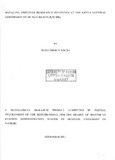| dc.description.abstract | The objective of the study was to establish how management responds to employee resistance at Kenya National Commission on Human Rights.
The research relied on both primary and secondary data. Primary data was collected through questionnaires. Questionnaires were administered on the randomly selected employees directly thus face-to-face interviews were also conducted. To obtain the sample size, and given the different categories of staff at Kenya National Commission on Human Rights, i.e. Commissioners/ Executives, Senior managements staff and General staff, proportional stratified random sampling technique was used. The final sample comprised of 22 staff members. Secondary data was obtained by examining the company’s publications. Content analysis was used to analyze the data.
The study has reveled that by managing employee resistance, KNCHR has been able to successfully undertake various organizational change initiatives. Some of the strategies which were used to manage employee resistance to the proposed organizational changes included; adjusting the organizational culture, change in strategic direction, support by top management, communicating changes in good time, training, participation, scheduling change and coercion. Benefits realized from mitigating against employee resistance included enhancing employee retention, increased level of employee productivity and positive spillover effects to KNCHR's customers. From the findings, important recommendations worth considering if organizations are to successfully address the phenomenon of employee resistance include; it is crucial that managers in such organizations have adequate skills in change management; secondly, it is essential that managers clearly recognize and identify the underlying causes of employee resistance to change as they occur and finally, managers need to take cognizance of the positive aspects of resistance. Current study, though with some limitations in term of response and scope of study, has served the purpose of initiating researching on employee resistance to change in an organizational setup, which can be used as a basis for further study and benefit to the management of other institutions. | en_US |



